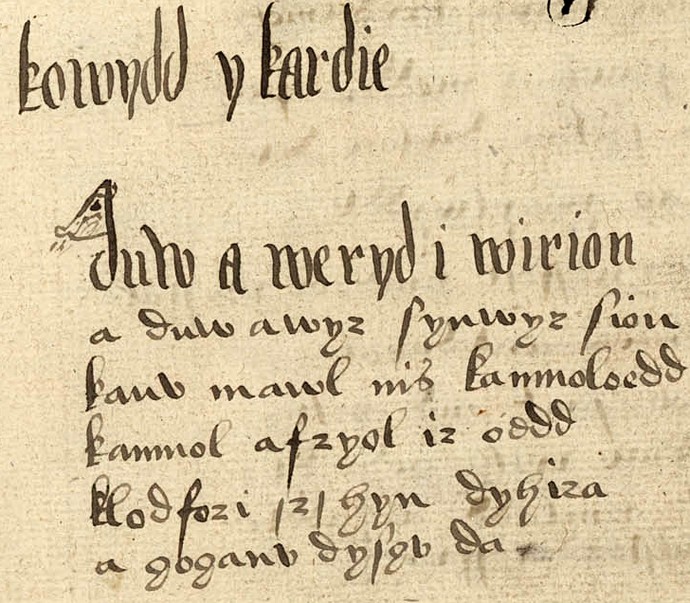The Poets of the Nobility
The Poets of the Nobility Project was the Centre’s third project. Building on the success of its internationally-acclaimed series of volumes on The Poets of the Princes , the Centre regularly published attractive and scholarly volumes on some of the finest poetry composed in the period between the Edwardian Conquest of 1282/3 and the death of Tudur Aled in 1526.
This work was published in the Poets of the Nobility Series , a rapidly expanding series comprising 36 volumes by the end of 2007. The volumes were typeset in-house and printed digitally.
The work was undertaken by a team of talented researchers, led by Dr Ann Parry Owen, and supported by a number of eminent senior scholars, including the staff of the Welsh universities. Since the Centre is physically linked to the National Library of Wales , one of five copyright libraries in the United Kingdom and the proud custodian of priceless Welsh and Celtic manuscripts, the research fellows have unrivalled access to primary material.

The Poets of the Nobility: Fuller Description
The Centre’s first project was an ambitious scheme to edit all the poetry of the Poets of the Princes in seven volumes under the editorship of Professor R. Geraint Gruffydd, the Centre’s first Director as a University institution. While working on this project, it became apparent that there existed a very considerable body of unedited poetry belonging to the period following that of the Poets of the Princes, namely the Poets of the Nobility. As the first project drew to a close, planning commenced for the Centre’s third project to edit the unedited work of the period 1282–1525. A list of all the poets and poems of the period was compiled in co-operation with the staff of the National Library of Wales, and with the aid of the computerized index to the manuscript poetry (MALDWYN). The volume of poetry to be edited was far more substantial than in the case of Project 1.
It was decided to concentrate initially on the fourteenth-century poetry, which was certainly one of the most important and exciting centuries in Welsh literature. Several poets continued to compose praise poetry and eulogy in the old style using the traditional metres, while at the same time Dafydd ap Gwilym and his followers began to develop the very different cywydd metre in order to elevate new themes, such as love. This was a turning-point in the strict-metre poetry, the period being characterized by a mixture of the old and traditional with the new and exciting. By the fifteenth century the number of poets and poems had increased substantially. This was the golden age of the cywydd metre.
The project was launched in 1993 and Dr Ann Parry Owen was appointed general editor and project leader. The project benefited from the vast knowledge of the late Emeritus Professor J. E. Caerwyn Williams (who was also the Consultative Editor for Project 1) and Emeritus Professor R. Geraint Gruffydd (who was the General Editor for Project 1) and the support of an Editorial Board of four eminent Welsh scholars, who regularly commented on each volume.
Each volume contains the work of one or more poets, and includes an introduction to the historical background and any known facts about the poet or poets in question. The text appears in modern Welsh orthography, and all the important manuscript variants are given. Short notes are provided on the personal names and place-names which occur in the text, and on any specific references and syntactical or metrical problems. Each volume contains an index to the notes and any unusual words, and to all the personal names and place-names. Manuscript sources are listed and an index to the first lines of the poems is provided.
By the end of 2007 thirty-six volumes had been published, and the few remaining volumes of the series will appear in 2008/9. All the volumes were typeset in-house and printed digitally to a high standard – a method usually associated with ’on-demand’ publishing, but one which is eminently suited to Welsh academic publishing where the market for such books is restricted.
The poet visits his nephews at Christmas
This is my task with my lords,
And I am also their agéd relative:
To read civil law to my kinsmen
(There is need of a fluent voice);
To dress myself in their fine gifts,
Green clothing from the splendid hand of each;
To satirize loudly that furious crew,
You can hear their commotion, the dunghill minstrels;
Gift after gift I’ve received,
Earnestly comparing my love, Lleucu Llwyd,
To a fair, blooming rose in a beautiful garden,
To the noble Virgin Mary, or to the brilliant sun.
It’s delightful for this scrawny old man
(There is a good time to be had on Sunday)
To hear the sounds which Christmas brings:
Cooks slicing into meat,
Barking of shaggy hunting dogs, I know for sure,
Straining at their chains,
The harmony of the lively crwth and the bagpipes,
The voices of peacocks in unison,
And the Sanctus bells, and laughter,
And the calling of men to wine.
Llywelyn Goch ap Meurig Hen ( fl . c .1350– c .1390)
